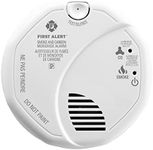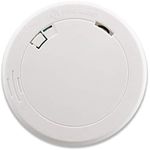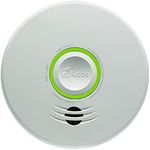We Use CookiesWe use cookies to enhance the security, performance,
functionality and for analytical and promotional activities. By continuing to browse this site you
are agreeing to our privacy policy
Best Smoke Alarms
From leading brands and best sellers available on the web.#2

First Alert
First Alert 9120LBLA Hardwire Smoke Alarm with 10 Year Battery
View Product
#3

First Alert
First Alert Hardwired Wireless Interconnect Smoke Alarm
View Product
#4

First Alert
First Alert 9120BA Hardwire Smoke Alarm w/ 9V Battery, Smoke Detector
View Product
#5

First Alert
7%OFF
FIRST ALERT Smoke and CO Alarm, SC7010BA, White
View Product
#6

First Alert
First Alert SC9120BA Hardwire Combination Carbon Monoxide and Smoke Alarm
View Product
#7

Kidde
13%OFF
Kidde P3010B-CA 10-Yr Battery Talking Smoke Alarm, White
View Product
#8

Google Nest Protect - Smoke Alarm - Smoke Detector and Carbon Monoxide Detector - Wired, White
View Product
#9

First Alert
22%OFF
First Alert PR700A Slim Series Battery Powered Photoelectric Smoke Alarm
View Product
#10

Kidde
Kidde P3010CU Photoelectric Smoke & Carbon Monoxide Alarm with Voice Warning System
View Product
Buying Guide for the Best Smoke Alarms
Choosing the right smoke alarm is crucial for keeping your home and loved ones safe. Smoke alarms are designed to detect smoke and alert you early in case of a fire, giving you precious time to react. When shopping for a smoke alarm, it's important to understand the different features and specifications so you can select the best one for your living space and needs. Think about where you will install the alarm, the size of your home, and any special requirements you might have, such as for people with hearing difficulties.Sensor TypeThe sensor type refers to the technology the smoke alarm uses to detect smoke. The two main types are ionization and photoelectric. Ionization sensors are generally better at detecting fast-flaming fires, while photoelectric sensors are more responsive to slow, smoldering fires. Some alarms combine both types for broader protection. If you want the best coverage, look for a dual-sensor alarm. If you know your home is more at risk for one type of fire (for example, kitchens often have more fast-flaming fires), you can choose accordingly.
Power SourceSmoke alarms can be powered by replaceable batteries, sealed long-life batteries, or hardwired into your home's electrical system. Battery-powered alarms are easy to install and can be placed anywhere, but require regular battery changes. Sealed long-life battery alarms usually last up to 10 years without needing a battery change, making them low-maintenance. Hardwired alarms are connected to your home's power and often have a battery backup for outages. Choose the power source that matches your comfort with maintenance and your home's setup.
InterconnectivityInterconnectivity means that when one alarm detects smoke, all connected alarms in the home will sound. This is especially important in larger homes or multi-story buildings, as it ensures everyone is alerted no matter where the fire starts. Some alarms are interconnected by wires, while others use wireless technology. If you have a large or multi-level home, or want maximum safety, look for alarms that can be interconnected.
Silence/Hush FeatureThe silence or hush feature allows you to temporarily silence the alarm, which is useful if it goes off due to cooking smoke or steam. This feature helps prevent people from disabling the alarm entirely out of frustration. If you cook often or have alarms near kitchens or bathrooms, this feature can be very helpful.
Test Button and Maintenance IndicatorsA test button lets you check if the alarm is working properly, and maintenance indicators alert you when the battery is low or the alarm needs attention. Regular testing is important for safety, so having an easy-to-use test button and clear indicators makes maintenance simple. If you want peace of mind and easy upkeep, look for alarms with these features.
Special Features (e.g., Strobe Lights, Voice Alerts)Some smoke alarms come with extra features like strobe lights or voice alerts, which are especially useful for people with hearing impairments or for children who may not wake up to a standard alarm. If you have family members with special needs, consider alarms with these additional alert methods.






